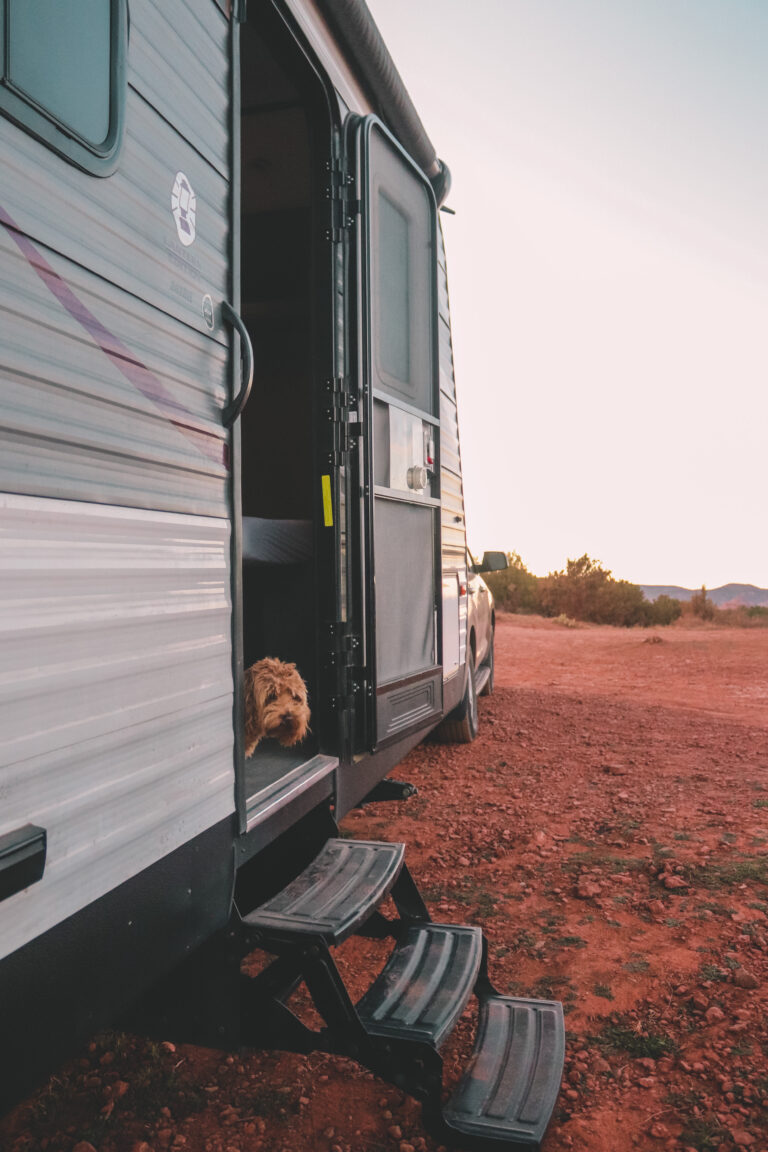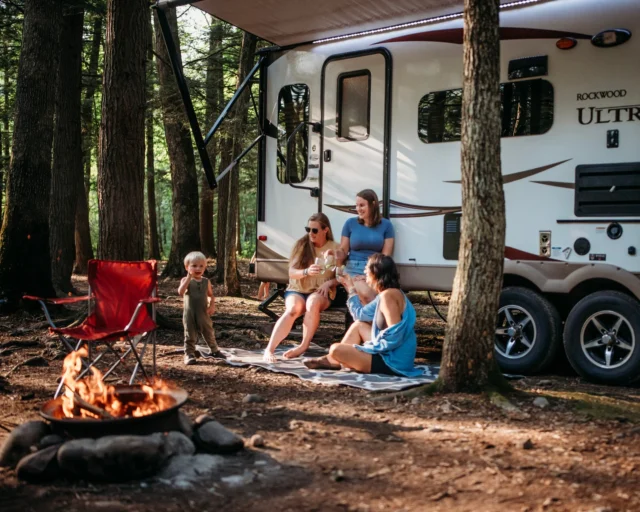
There are lots of reasons a camper might decide to choose a travel trailer rather than a self-powered motor coach.
It’s not just because travel trailers can be so much more affordable (given that you already have a capable tow vehicle).
Sure, it’s convenient — and, OK, maybe even a little fun — to be able to make a sandwich or use the restroom while your trusty driver is navigating your house on wheels down the road. And there’s something to be said for not having to do a whole lot to set up camp aside from, well, parking the dang thing.
But travel trailers allow you tons of flexibility and convenience that motorhomes lack. For one thing, you’ll automatically have a smaller, secondary vehicle available with which to explore your destination, which can become problematic if you’re in a large motorcoach and your regular car isn’t set up to tow.
Travel trailers also offer some of the very best bang for your buck in the way of living space and amenities. After all, travel trailers don’t have to devote any interior room or manufacturing budget to installing a cockpit or chassis, so their designers have more room to build out functional and luxurious features.
But one drawback of RVing with a trailer is the intimidation so many drivers feel creeping up on them when they so much as think about driving one. It makes sense. A travel trailer makes an already-large truck into a huge rig with a lever in the middle. How much more space do you need to leave for braking? Which way do you turn to back it up the right way, again? What if it jackknifes?
But before you send yourself into a tizzy, take a few deep breaths. Safe travel trailer and pop-up camper towing are totally possible, so long as you follow safe trailering procedures. And we promise it’s not as hard as you might imagine.
Here are some easy-to-follow towing safety tips that will help put your mind to ease on your upcoming travel trailer adventure.
Towing a Trailer
Never towed anything before in your life? Here’s where to start.
1. Make sure you have a capable tow vehicle.
Just because your vehicle is equipped with a tow hitch doesn’t mean it’s got what it takes to tow your RV. And even some large, seemingly-capable trucks and SUVs have a surprisingly low towing capacity.
Instead of just hooking it up and hoping for the best, you need to find the official documentation about your vehicle’s towing capacity, and compare it to the weight of your trailer — including the weight of all the stuff you put into it! Although no one expects you to weigh out every piece of clothing or box of cereal you bring on board, a good rule of thumb to look for is the GVWR, which is the maximum total load weight the RV is rated for.
Make sure your towing capacity is at or above that number. Not only is it a safety concern, but it also voids many RV insurance policies if your tow vehicle doesn’t cut it.
2. Pack light.
Water alone weighs more than eight pounds per gallon. That’s why it’s a much better idea to fill up your tank right before you set up camp, rather than dragging it around while you’re en route to your destination.
Although water will be a chief concern, you should also go easy on clothing, food, accessories, gear, and everything else, too. Not only can it weigh down your trailer, but it’ll also make your enclosed space feel much more claustrophobic.
Trailer Safety
Don’t worry. If you’re careful, pulling a trailer is as safe as any other kind of RVing. But you do need to keep a few things in mind.
3. Here’s the scoop on trailer weight distribution.
It might sound complicated, but it’s really simple.
Basically, the majority of the trailer’s total load weight — 60% or more — needs to be concentrated in the front end of the RV to help keep it running smooth and straight on the road behind your tow vehicle. When too much weight — more than 40% — is concentrated in the back of the trailer, it becomes “tail heavy,” capable of wagging the dog, so to speak. (In other words: It could whip you off the road. Not good!)
Fortunately, this is a pretty simple problem to avoid. RVs are designed with these physics in mind, so the weightier appliances and tanks are generally situated toward the front. Some trailers might even have a special weight-distributing camper trailer hitch to help make you even safer.
But just to be careful, don’t pile everything you own into the rear cabin!
Safe Trailer Towing Basics
Yes, there’s a learning curve when it comes to towing… but it’s not as hard as you might think!
4. Take it slow.
While you’ll probably hear lots of different advice when you’re first starting out with your travel trailer, here’s one rule that’s never contested.
No matter what, take it nice and easy when you’re towing.
You’ve got a whole lot of weight behind you, which makes everything take longer — speeding up, slowing down, and stopping. While there’s no one magic safe speed for towing a travel trailer, it’s much easier to get into an accident if you’re speeding, and you could lose control of the rig.
So hang out in the right hand lane and get used to watching smaller cars pass you. You took an RV to actually see the country, right? Relax and enjoy the journey!
Safe Trailer Towing Guide
Stay safe and sound on the road.
5. Never slam on the brakes.
You already know your trailer is too heavy to stop on a dime. But what you might not know is that if you try, all that weight can make you more prone to skidding, jackknifing, and worse.
This is to say: No matter what happens, don’t slam on your brakes. (This ties back into item #4 on the list– if you’re not speeding, you’re less likely to need to.)
Many trailers come equipped with electronic brakes which help regulate the stopping process. In fact, depending on your state and the trailer’s weight, having a braked trailer might even be written into legal safe trailer towing regulations. Either way, your RV dealer will make sure you’re well acquainted with these accessories before you leave the sales floor.
See? Hitch and towing safety doesn’t have to be complicated. Once you spend a little time behind the wheel and in front of the hitch, you’re sure to get the hang of it.
Enjoy your trip, and stay safe out there!






